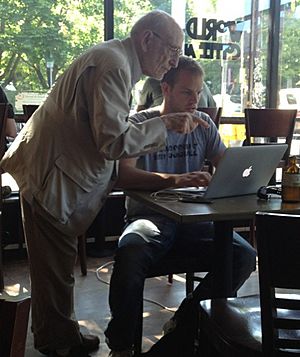Russell A. Kirsch facts for kids
Quick facts for kids
Russell Kirsch
|
|
|---|---|

Russell Kirsch in Portland, Oregon with Joel Runyon
|
|
| Born | June 20, 1929 Manhattan, New York, U.S.
|
| Died | August 11, 2020 (aged 91) Portland, Oregon, U.S.
|
| Education | Bronx High School of Science (1946), BEE New York University (1950), SM Harvard University (1952), American University, Massachusetts Institute of Technology |
| Occupation | Computer scientist |
| Known for | First digital image scanner |
| Spouse(s) | Joan (née Levin) Kirsch |
| Children | Walden Kirsch (KGW reporter), 3 other children |
Russell A. Kirsch (born June 20, 1929 – died August 11, 2020) was a clever American engineer and computer scientist. He worked at a place called the National Bureau of Standards. This place is now known as the National Institute of Standards and Technology.
Russell Kirsch is famous for inventing the pixel. He also created the very first digital image scanner. He passed away in Portland, Oregon, at the age of 91.
Contents
Russell Kirsch's Big Ideas
Russell Kirsch made some really important inventions that changed how we see pictures today. He helped create the digital world we live in.
Inventing the Pixel
Russell Kirsch is often called the "inventor of the pixel." A pixel is a tiny square dot that makes up a digital image. Think of it like a small tile in a big mosaic picture.
- Every picture you see on a computer screen, phone, or TV is made of millions of these tiny pixels.
- Each pixel has a specific color. When you put them all together, they form a complete image.
- Kirsch's work helped us understand how to break down images into these small pieces.
The First Digital Image Scanner
In 1957, Russell Kirsch and his team built the first digital image scanner. This was a huge step forward for computers.
- This scanner could turn a physical picture into a digital one.
- The very first image they scanned was a picture of Kirsch's three-month-old son, Walden.
- This invention meant that pictures could now be stored and shared on computers.
How the Scanner Worked
The scanner used a special drum that rotated. It had a light that would shine on the picture. A sensor would then measure how much light bounced back.
- This information was turned into numbers.
- These numbers represented the brightness of each tiny spot on the picture.
- This was how the first digital image was created, pixel by pixel.
Russell Kirsch's Life
Russell Kirsch was born in Manhattan, New York, in 1929. He was always interested in how things worked.
His Education
He went to some excellent schools to learn about engineering and science.
- He studied at the Bronx High School of Science.
- He earned degrees from New York University and Harvard University.
- He also studied at the Massachusetts Institute of Technology.
His Work and Legacy
Kirsch spent most of his career at the National Bureau of Standards. His work there helped lay the foundation for many things we use every day.
- His inventions led to digital cameras, computer graphics, and even medical imaging.
- He helped us move from a world of only physical photos to one where images are everywhere digitally.
- Russell Kirsch passed away in 2020, but his ideas live on in every digital screen.
Images for kids
-
Pioneering digitally scanned image of Russell Kirsch's son Walden, 1957
See also
 In Spanish: Russell A. Kirsch para niños
In Spanish: Russell A. Kirsch para niños
 | DeHart Hubbard |
 | Wilma Rudolph |
 | Jesse Owens |
 | Jackie Joyner-Kersee |
 | Major Taylor |


